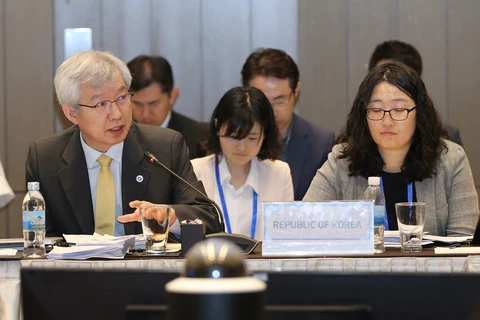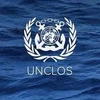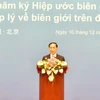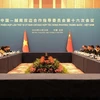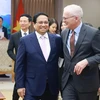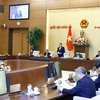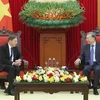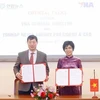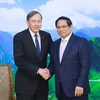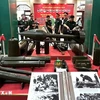Khanh Hoa (VNA) – Established in November 1989 with 12 founding members, the Asia-Pacific Economic Cooperation (APEC) Forum has now become the region’s largest economic cooperation mechanism with 21 economies which together account for 39 percent of the world’s population, 59 percent of the world’s GDP and 48 percent of the global trade.
The overall goal that the APEC members have pursued over the past years is to promote trade and investment liberalisation and expand regional economic connectivity by developing infrastructure and building reliable and transparent supply chains towards a Free Trade Area of the Asia-Pacific (FTAAP). APEC was the first multilateral economic forum to reach consensus on the List of Environmental Goods which has promoted by the World Trade Organisation (WTO).
Vietnam officially joined APEC in 1998 and hosted APEC Year for the first time in 2006. This year, Vietnam proposed the theme, priorities and work for APEC with the inheritance of achievements from the previous hosts and its own initiatives in a bid to accelerate the implementation of the forum’s overall goal towards a prosperous community.
Built around the overarching theme of "Creating New Dynamism, Fostering a Shared Future", Vietnam has proposed four priorities: Promoting Sustainable, Innovative and Inclusive Growth; Deepening Regional Economic Integration; Strengthening MSMEs’ Competitiveness and Innovation in the Digital Age; and Enhancing Food Security and Sustainable Agriculture in Response to Climate Change. Of these, Vietnam inherited the cooperation priorities related to regional economic integration and food from the Peru, the host of APEC Year 2016.
The overall goal that the APEC members have pursued over the past years is to promote trade and investment liberalisation and expand regional economic connectivity by developing infrastructure and building reliable and transparent supply chains towards a Free Trade Area of the Asia-Pacific (FTAAP). APEC was the first multilateral economic forum to reach consensus on the List of Environmental Goods which has promoted by the World Trade Organisation (WTO).
Vietnam officially joined APEC in 1998 and hosted APEC Year for the first time in 2006. This year, Vietnam proposed the theme, priorities and work for APEC with the inheritance of achievements from the previous hosts and its own initiatives in a bid to accelerate the implementation of the forum’s overall goal towards a prosperous community.
Built around the overarching theme of "Creating New Dynamism, Fostering a Shared Future", Vietnam has proposed four priorities: Promoting Sustainable, Innovative and Inclusive Growth; Deepening Regional Economic Integration; Strengthening MSMEs’ Competitiveness and Innovation in the Digital Age; and Enhancing Food Security and Sustainable Agriculture in Response to Climate Change. Of these, Vietnam inherited the cooperation priorities related to regional economic integration and food from the Peru, the host of APEC Year 2016.
At the first APEC Senior Officials Meeting (SOM1), being held in Khanh Hoa province’s Nha Trang city from March 2-3, delegates highly evaluated and supported the priorities proposed by Vietnam, saying that the inheritance is necessary to bring in good results, benefiting all APEC member economies.
Talking with the Vietnam News Agency’s correspondents, Lahui Ako, Director-General at the APEC Secretariat of Papua New Guinea - the host country of APEC Year 2018 - said many APEC members are developing economies. This year, the agenda has various issues that are very important to the developing economies, particularly Papua New Guinea, such as rural, economic and human resources development.
“The priorities are often determined by the next hosts two or three years earlier. Discussions in Vietnam this year could be continued in Papua New Guinea. Based on Vietnam’s agenda, we shared our ideas about connectivity, export subsidy and trade issues at the meeting,” he added.
As the host of APEC Year 2019, Chile expected that will be a chance for delegates from the member economies to study the society and private sector in Chile and how the APEC priorities are put in place, said Marcela Otero, Director of Multilateral Economic Affairs at the Ministry of Foreign Affairs of Chile.
“We will continue with APEC’s common priorities and work in half done in Peru last year, Vietnam this year and Papua New Guinea in 2018. That is the continuity for prosperity in our region,” she said.
According to the official, there will be a lot of events in 2020, including the deadline for the Bogor Goals. In 2010, developed economies failed to achieve the Bogor Goals, hence, Chile expected the goals will be fulfilled in 2020.
Twenty-eight years on since APEC’s inception, the forum’s journey with the continuity, inheritance and initiatives always looks towards a prosperous Asia-Pacific region.-VNA
Talking with the Vietnam News Agency’s correspondents, Lahui Ako, Director-General at the APEC Secretariat of Papua New Guinea - the host country of APEC Year 2018 - said many APEC members are developing economies. This year, the agenda has various issues that are very important to the developing economies, particularly Papua New Guinea, such as rural, economic and human resources development.
“The priorities are often determined by the next hosts two or three years earlier. Discussions in Vietnam this year could be continued in Papua New Guinea. Based on Vietnam’s agenda, we shared our ideas about connectivity, export subsidy and trade issues at the meeting,” he added.
As the host of APEC Year 2019, Chile expected that will be a chance for delegates from the member economies to study the society and private sector in Chile and how the APEC priorities are put in place, said Marcela Otero, Director of Multilateral Economic Affairs at the Ministry of Foreign Affairs of Chile.
“We will continue with APEC’s common priorities and work in half done in Peru last year, Vietnam this year and Papua New Guinea in 2018. That is the continuity for prosperity in our region,” she said.
According to the official, there will be a lot of events in 2020, including the deadline for the Bogor Goals. In 2010, developed economies failed to achieve the Bogor Goals, hence, Chile expected the goals will be fulfilled in 2020.
Twenty-eight years on since APEC’s inception, the forum’s journey with the continuity, inheritance and initiatives always looks towards a prosperous Asia-Pacific region.-VNA
source




